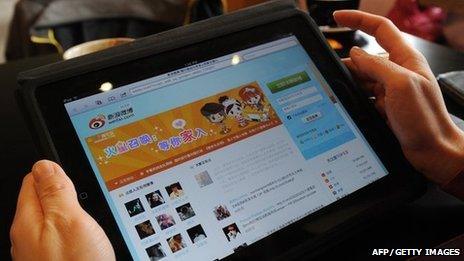Online anger 'spreads faster than joy' on Weibo
- Published

Anger rapidly spreads through Weibo, researchers found
Anger spreads faster online than other emotions such as joy, scientists say.
A team analysed the word choice and emoticons of people's posts on the Chinese social network Weibo and split them into the categories of anger, sadness, joy and disgust.
By analysing the influence messages had with other users, they observed angry sentiments were more rapidly shared.
However, others say this is because angry people tend to have more angry friends.
The study has been published on the Arxiv pre-print server, external, though it has yet to be subjected to peer review.
The team from Beihang University in Beijing says its work could give insight into how information spreads through social networks, influencing others along the way.
"Users on Weibo tend to repost angry news posted by their friends while deeper explorations still need more investigations," Ke Xu, one of the co-authors, told BBC News.
'Formation of public opinion'
"We mined the reposted angry messages and found that most of them were related to social problems in China or the diplomatic issues between China and foreign countries," he said.
Weibo had become the most convenient channel for people in China to take part in the discussion of social problems and to express their concerns. Reposting information was a "symbolic action" for expressing viewpoints.
"The angry mood delivered through social ties could boost the spread of the corresponding news, and speed up the formation of public opinion and collective behaviour," Prof Xu said.
The team collected more than 70 million messages from 200,000 users over a six-month period in 2010 to analyse keyword topics and how many times a message was reposted.
Weibo is China's equivalent of Twitter and now has more than 500 million users, who post about 100 million updates a day.
Sadness was not quickly shared, and the authors said it required more detailed exploration to observe the underlying reasons.
Christo Wilson, a US-based researcher at Northeastern University in Boston, Massachusetts, who was not involved with the work, also undertakes analysis of Weibo.
He said that the headline result of the latest study was "slightly sensational as the research does not back this up".
Dr Wilson told BBC News: "The authors show that people who have a particular emotional disposition tend to group together and interact with each other, but whether the information will spread beyond that angry group is difficult to predict.
"The work definitely shows that accounts that tend to post angry stuff tend to group together, but from that you cannot necessarily infer the spread of information. That claim is too strong."
Map mood of nation
Social media networks now enable researchers to analyse immediately what people are saying about a range of topics.
Recently, British scientists developed a computer program that can map the mood of the nation through the use of Twitter.
They found that the emotions people expressed were closely linked to real events and could help identify early threats to public safety.
One of the team members was Thomas Jackson, of the University of Loughborough. He said of the Weibo study that there was already a good body of research showing that negative emotions spread faster than positive ones.
"There are many grades of 'anger' and many ways of expressing it.
"It's pretty natural that, if you are worked up about something, your followers are to a large extent likely to show the same emotion. We normally 'follow' people like ourselves," he told BBC News.
- Published7 September 2013
- Published29 September 2011
- Published1 August 2012